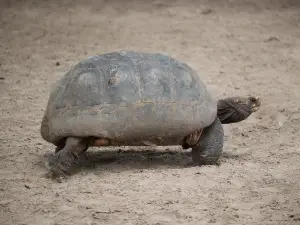
As a responsible pet owner, the well-being of your pet should be your top priority, this includes the internal and external health of the animal, like the shell.
This article looks into whether your turtle’s shell is healthy and how to tell
Table of Contents
Is my turtle’s shell healthy?
Recognizing the signs of a healthy turtle shell will empower you to pick up if your pet’s shell is healthy or unhealthy
Here are signs to look for that signal that your pet turtle’s shell is healthy:
Normal color:
A normal shell coloring and a uniform shell coloring are signs that your pet’s shell is healthy. A healthy turtle shell will not have any odd spots of color on it.
While turtle shell color may vary from species to species, as long as there are no patches of discoloration or spots of abnormal pigmentation on the shell then the shell is likely healthy.
Hard shell:
The strength of a turtle’s shell is a tell of whether the shell is healthy or not. A healthy turtle shell maintains its strength and structure. If your pet’s shell is not strong then there is something wrong.
Soft shells are usually a sign of metabolic bone disease.
That being said, younger turtles generally have softer shells and their shells only harden, and fully form, once the animal is a couple of months or years old
Smooth shells:
Healthy shells will be one big homogenous piece with no pitting, dents, pits, divots, depressions, or any other signs of damage. Basically, a shell that is smooth is healthy and a shell that isn’t smooth is not healthy
The shells of healthy turtles will also not have any cracking, splitting, or breaking, these are usually signs of trauma.
No discharge:
The shells of healthy turtles are generally dry and free from any sort of residue or discharge.
The shells of unhealthy turtles may have a runny discharge, slime, or fluid on them or under the scales.
Normal smell:
Turtles aren’t supposed to smell like much of anything. So, if your turtle’s shell starts to smell, especially if the smell is harsh, or strong then the animal’s shell is not healthy.
If you enjoyed this article then you may also be interested in other turtle/tortoise related articles. Here are some articles that you may be interested in: Why Are My Turtle’s Eyes Cloudy?, Why Are My Turtle’s Eyes White?, Why Is My Turtle’s Shell Turning Brown?, Why Is My Turtle Shell Chipping, Why Is My Turtle’s Shell Coming Off?, Why Is My Turtle Biting His Shell?, My Baby Turtle Won’t Eat, Why Is My Turtle Shell Turning Black?, Why Is My Turtles Skin Dry,

